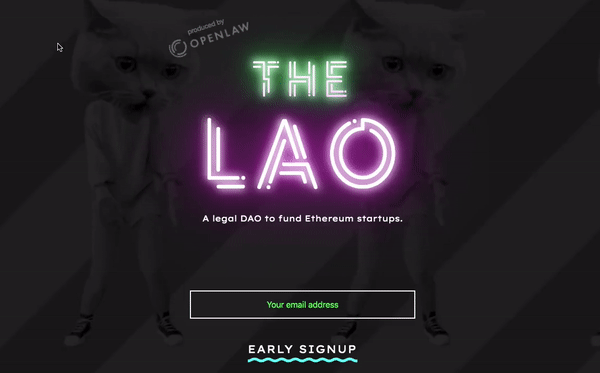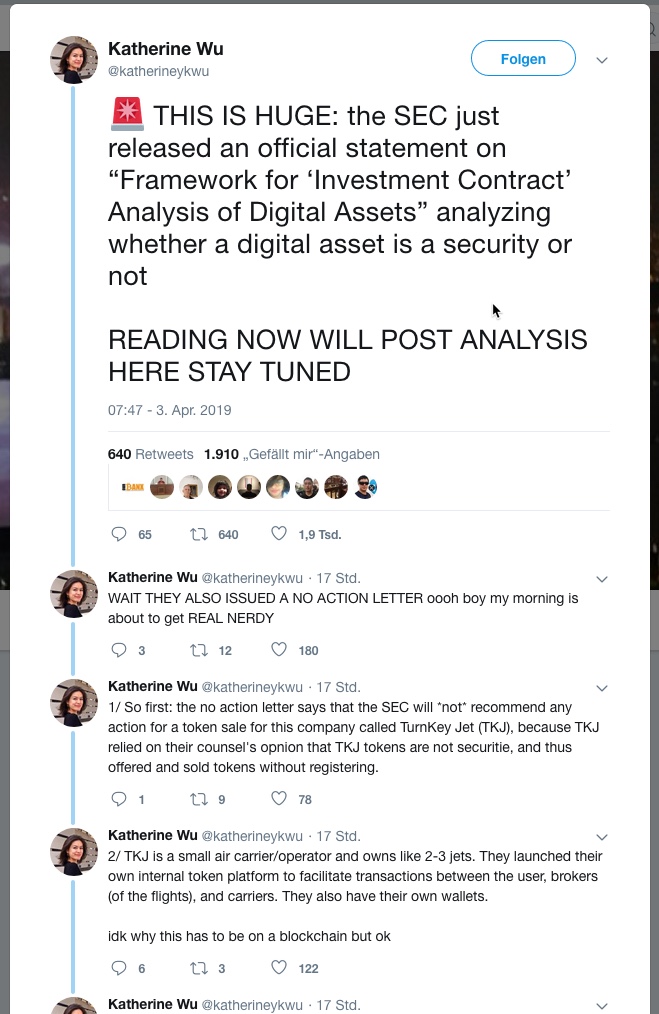Mit dem BMF-Schreiben „Einzelfragen zur ertragsteuerrechtlichen Behandlung von virtuellen Währungen und von sonstigen Token“ gibt das Bundesministerium der Finanzen den Praktikern in Finanzverwaltung und Wirtschaft, aber auch den einzelnen Steuerpflichtigen einen rechtssicheren und praktikablen Leitfaden zur ertragsteuerrechtlichen Behandlung nicht nur von Bitcoin an die Hand. Das BMF-Schreiben wurde in enger Abstimmung mit den obersten Finanzbehörden der Länder erarbeitet. Behandelt werden neben dem An- und Verkauf virtueller Währungen und sonstiger Token insbesondere die Blockerstellung, die bei Bitcoin Mining genannt wird. Daneben beschäftigt sich das BMF-Schreiben mit Staking, Lending, Hard Forks, Airdrops, den ertragsteuerrechtlichen Besonderheiten von Utility und Security Token sowie Token als Einkünfte aus nichtselbständiger Arbeit.
September 24, 2020, 8:50AM EDT · 2 min read
Quick Take
- The European Commission has today officially proposed a regulatory framework for crypto-assets and stablecoins after a leaked draft proposal went viral last week.
- The official proposal recommends a “bespoke” regime for crypto-assets and stablecoins.
The 168-page official draft proposal (provisional), published Thursday, highlights the need for a „sound“ legal framework, clearly defining the regulatory treatment of all crypto-assets that are not covered by existing EU financial services legislation.
Crypto assets, especially stablecoins, have the potential to become widely accepted, said the commission. Hence, they would be subject to „more stringent requirements“ regarding capital, investor rights, and supervision. The proposal is in line with the leaked version from last week.
The commission has today proposed a „bespoke“ regime for crypto-assets and stablecoins. „The bespoke regime for crypto-assets will ensure a high level of consumer and investor protection and market integrity, by regulating the main activities related to crypto-assets,“ said the commission. The main activities include such as crypto exchange and wallet services.
„By imposing requirements (such as governance, operational requirements) on the main crypto-asset service providers and issuers operating in the EU, the proposal is likely to reduce the amounts of fraud and theft of crypto-assets,“ said the commission, adding:
„The bespoke regime will introduce specific requirements on e-money tokens, significant e-money tokens, asset-referenced tokens and significant asset-referenced tokens in order to address the potential risks to financial stability and monetary policy transmission these can present. Finally, it will address market fragmentation issues arising from the different national approaches across the EU.“
The commission has today also proposed a regulatory sandbox to allow companies to test blockchain technology in trade and settlement processes.
The proposals are part of the commission’s newly adopted Digital Finance Package. The package will „boost Europe’s competitiveness and innovation in the financial sector, paving the way for Europe to become a global standard-setter,“ said the commission. „It will give consumers more choice and opportunities in financial services and modern payments, while at the same time ensuring consumer protection and financial stability.“
Source: theblockcrypto.com
PDF-Document – REGULATION OF THE EUROPEAN PARLIAMENT AND OF THE COUNCIL
BaFin nimmt Interessenbekundungen entgegen
Durch das Gesetz zur Umsetzung der Änderungsrichtlinie zur vierten EU-Geldwäscherichtlinie wird das Kryptoverwahrgeschäft als neue Finanzdienstleistung in das KWG aufgenommen. Das vom Gesetzgeber bereits beschlossene Gesetz tritt am 01.01.2020 in Kraft. Unternehmen, die dieses Geschäft dann erbringen wollen, benötigen eine Erlaubnis der BaFin. Die BaFin bittet interessierte Unternehmen bereits jetzt um eine formlose und unverbindliche Interessenbekundung.
Anträge für die Erlaubnis zur Erbringung des Kryptoverwahrgeschäftes kann die BaFin erst entgegennehmen, wenn das Gesetz in Kraft ist. Gleichwohl bittet die BaFin bereits jetzt um Interessenbekundungen von Unternehmen, die bereits das Kryptoverwahrgeschäft erbringen oder die Erbringung beabsichtigen.
Diese Interessenbekundungen sollten neben dem Namen des Unternehmens und der Ansprechpartner auch ein kurze Beschreibung des Geschäftsmodells von maximal einer Seite enthalten. Weitere Informationen sind vorläufig nicht einzureichen.
Die Interessenbekundungen sind vorzugsweise per E-Mail oder postalisch an folgende Adresse zu senden:
Bitte beachten Sie die Hinweise zur gesicherten Kommunikation per E-Mail mit der BaFin.
Die BaFin möchte mit diesem Verfahren einen reibungslosen Übergang auf die neue Rechtslage ermöglichen und frühzeitig einen Überblick über den Markt erhalten. Die Unternehmen werden auf ihre Interessenbekundung keine unmittelbare Eingangsbestätigung oder Einschätzung zu den eingereichten Angaben erhalten.
Es ist beabsichtigt den Unternehmen, die ihr Interesse bekundet haben, nähere Informationen und Hinweise mitzugeben, sobald die BaFin ihre Verwaltungspraxis zu der Zulassung und der laufenden Aufsicht für die neue Finanzdienstleistung konkretisiert hat. Grundsätzlich richtet sich das Erlaubnisverfahren für das Kryptoverwahrgeschäft nach § 32 Abs. 1 KWG, weshalb das bereits bestehendeMerkblatt der Deutschen Bundesbank über die Erteilung einer Erlaubnis zum Erbringen von Finanzdienstleistungen vom 06.07.2018 berücksichtigt werden kann. Die Unternehmen sind daher eingeladen ihre Interessenbekundung mit aus ihrer Sicht noch offenen Grundsatzfragen zu verbinden. Die Interessenbekundung ist formlos und unverbindlich. Sie ist zudem freiwillig und hat keine Auswirkungen auf ein zukünftiges Erlaubnisverfahren.
Die Interessenbekundung ersetzt nicht die förmliche Anzeige nach § 64y KWG n.F. Das Gesetz sieht in § 64y KWG n.F. verschiedene Übergangsbestimmungen für bereits tätige Unternehmen vor. Für ein Unternehmen, das auf Grund des neuen Erlaubnistatbestands Kryptoverwahrgeschäft ab dem 01.01.2020 zum Finanzdienstleistungsinstitut wird, gilt die Erlaubnis für den Betrieb dieses Geschäfts als zu diesem Zeitpunkt vorläufig erteilt, wenn es bis zum 30. November 2020 einen vollständigen Erlaubnisantrag stellt und wenn es die Absicht, einen Erlaubnisantrag zu stellen, bis zum 31. März 2020 der Bundesanstalt schriftlich anzeigt. Die gesetzliche Vorgabe in § 64y KWG n.F. setzt nach ihrem Wortlaut eine schriftliche Absichtsanzeige voraus.
Hier ein etwas ausführlicher Artikel zu diesem Thema: New law makes Germany “crypto heaven”
The legislation enables banks to sell and store cryptocurrencies from January 1, 2020. Other providers will now require a German license.

The new legislation will come into force on 1 January 2020, and will require current custody providers and crypto exchanges operating in the country to take steps, before the end of the year, to apply for a German license.
The law will not only put Germany, the world’s fourth biggest economy, at the forefront of regulation in cryptocurrencies, but heralds a milestone in the adoption of cryptocurrencies.
“Germany leads the way in crypto regulation, for sure. This leads to institutional investors coming to Germany, as they want security and regulation,” Sven Hildebrandt, partner at German crypto consultancy DLC, told Decrypt. „Germany is well on its way to becoming a crypto-heaven.”
The bill was passed by the Bundestag, the lower house of the German Parliament, earlier this month, and approved by the upper house, the Bundesrat, today.
It amends a clause in the European Union’s Fourth Anti-Money Laundering Directive that currently prohibits banks from dealing directly in cryptocurrency. It allows them to legally sell and store cryptocurrencies, just as they do stocks and bonds, to retail as well as institutional investors.
At the same time, exchanges such as Binance and Kraken, and other digital asset custodians, will need to obtain a license from the German regulator, Bafin, if they wish to continue operating in Germany, said Hildebrandt.
In order to apply for this, companies will need a German legal entity with two directors operating in the country by the end of 2019. They also need to signal their intention to apply to Bafin for a license before 31 March 2020, and submit the application prior to 31 November 2020.
Digital asset custodians who have not established a legal identity in Germany before the end of the year will be deemed illegal by 2 January 2020, said Hildebrandt.
He said this leaves companies wishing to continue provide services in Germany with three options: to set up a German company before the end of this year, and then apply for a licence; to work with a cryptocurrency custodian who is licensed in Germany, or to work with a licence provider, which can offer a “complex but clever“ solution.
Companies have already begun to act on the new German law. Crypto Storage, a subsidiary of Swiss financial services provider, Crypto Finance announced plans to open an office in Frankfurt today.
Hildebrandt said that the new law will be a major breakthrough. “If you can hold [cryptocurrencies] in your bank account, that is massive for adoption,” he said. “I believe that this will act as a role model for all the other laws that will be coming into force Europe wide. Germany is driving crypto adoption forward and wants to play a leading role in Europe as well. One of the key challenges is keeping private keys safe.”
The proposals were also greeted with enthusiasm by Germany’s banking community.
But consumer protection watchdogs have warned that it could mean banks could aggressively pitching cryptocurrencies to uneducated customers, putting them at risk.
Source: https://decrypt.co/12603/new-law-makes-germany-crypto-heaven
Das Bundeskabinett hat heute (Anm. 18.09.2019) die Blockchain-Strategie verabschiedet. Das Bundesministerium für Wirtschaft und Energie (BMWi) und das Bundesministerium der Finanzen (BMF) haben sie unter Einbeziehung der übrigen Ressorts erarbeitet.
Bundeswirtschaftsminister Peter Altmaier: „Die Potenziale der noch jungen Blockchain-Technologie sind hoch. Deutschland ist dabei weltweit unter den führenden Standorten. Mit der Blockchain-Strategie wollen wir dazu beitragen, diesen Vorsprung zu halten und auszubauen. Ein Fokus liegt dabei im Energiebereich. Hier können wir doppelt punkten, indem wir in Pilotprojekten die Chancen der Blockchain-Technologie nutzen und gleichzeitig die Digitalisierung der Energiewende vorantreiben.“ Weiterlesen
Source: The LAO – Medium · 11 min read
OpenLaw will be launching the first limited liability for-profit DAO, named the LAO. The LAO will enable members to invest in Ethereum new ventures and generate a profit. A new era of DAOs is beginning.

The LAO: A For-Profit, Limited Liability Autonomous Organization
Since first proposed in 2013, the notion of decentralized autonomous organizations (DAOs) has animated the dreams of blockchain developers. For many, these Internet-native organizations represent the next step in the evolution of social and economic coordination, with blockchain technology and smart contracts streamlining voting, decision making, and the allocation of digital assets.
The notion of a DAO did not emerge in a vacuum. Instead, these organizations build on a long lineage of technical and legal innovation. The Romans devised a variety of commercial entities, such as the societas peculium and societas publicanorum, that enabled parties to share in an enterprise’s profits and losses while also providing limited liability. During the Middle Ages, Italians pioneered early versions of a limited partnership to finance maritime trade. Joint-stock companies emerged in England and the Netherlands in the 1600s, providing organizations state-granted monopolies to engage in productive commercial enterprises. The modern corporation took root in the United States in 1811, when New York granted private parties the power to form their own corporate structures without an extensive approval process. Weiterlesen
Die United States Securities and Exchange Commission (SEC) hat eine Stellungnahme zu den Rahmenbedingungen für ‘Investment Contract’ Analysis of Digital Assets” veröffentlicht. Dabei geht es beispielsweise darum welche Token als Security (Aktie) behandelt werden. Regulatorisch ist das Dokument eher für geplante ICO’s interessant als für den eigentlichen Token-Nutzer. Zudem handelt es sich dabei eher um eine Richtlinie als ein verbindliches Schreiben.
Hier das Original der SEC: SEC – DLT framework pdf
Es hat ein wenig gedauert, bis das Bundesfinanzministerium das Urteil des Europäischen Gerichtshofs zur bundesdeutschen Tatsache gemacht hat. Aber nun ist es soweit. Sorgen, dass es irgendwie doch noch zu einer Verumsatzsteuerung von Bitcoin-Verkäufen kommt, haben sich damit endgültig erledigt.
Nachdem wir vor etwa zwei Wochen die Meldung hatten, dass das Finanzamt Bonn-Innenstadt versucht, von einem Bitcoin-Unternehmer die Umsatzsteuer für den Verkauf von Bitcoin zu verlangen, hat dies für ein gewisses Entsetzen in der Szene gesorgt. Unbestätigten Berichten zufolge hat dies zu Schlaflosigkeit unter Bitcoin-Tradern geführt und in einem extremen Fall sogar eine Psychose ausgelös. Manch ein Trader begann, sich wegen der potenziell hohen Umsatzsteuernachforderung um seine wirtschaftsliche Existenz zu fürchten. Mit ausgelöst wurde die Unruhe etwa durch Berichte des Steuerberaters Rüdiger Quermann sowie des Rechtsanwalts István Cocron.
Experten wie der Steuerberater Diplom-Kaufmann Christian Densch aus Essen, der als „Kryptotaxpert“ Gastgeber einer beliebten Facebook-Gruppe ist, haben von Anfang an energisch darauf hingewiesen, dass hier unnötig Panik verbreitet wird. Die Forderungen des Finanzamtes Bonn-Innenstadt seien in keinster Weise zu halten. Sie seien auch kein Ausfluss einer wie auch immer gearteten Verschwörung der Finanzämter, die nun versuchten, Bitcoin kaputt zu machen und die Bitcoin-Trader zu ruinieren, sondern lediglich das Ergebnis einer gewissen Trägheit der Behörden. Es sei weder notwendig, sich Sorgen zu machen, noch angebracht, Ängste zu schüren oder gar das persönliche Armageddon zu verkünden.
Wie sich bald darauf zeigte, hat der Steuerberater Christian Densch recht. Ihm gelang es im persönlichen Gespräch und einem darauf folgenden E-Mail-Verkehr, eine zur Veröffentlichung freigegebene Einschätzung von Dr. Christian Hufen zu bekommen. Dr. Hufen ist Persönlicher Referent des Parlamentarischen Staatssekretärs des Bundesministeriums für Finanzen, Dr. Michael Meister. Er schreibt, dass sich Kryptotaxperts „Vermutung, dass der Umtausch von Bitcoins in andere Währungen unter eine Umsatzsteuerbefreiung fällt, bestätigt“ hat. Es gilt die Entscheidung des Europäischen Gerichtshofes im Fall Hedqvist. „Danach handelt es sich bei dem Umtausch konventioneller (gesetzlicher) Währungen in Einheiten der virtuellen Währung ‚Bitcoin‘ und umgekehrt um eine Dienstleistung gegen Entgelt, die unter die Steuerbefreiung nach Art. 135 Abs. 1 Buchst. e der Richtlinie 2006/112/EG des Rates vom 28. November 2006 (sog. EU-Mehrwertsteuer-Systemrichtlinie, MwStSystRL) fällt.“
Der Steuerberater Densch hat noch einige weitere Fragen gestellt – etwa zum Mining oder zur steuerlichen Handhabung von Zahlungen mit Bitcoin – auf die der Persönliche Referent interessante, und im großen und ganzen auch erfreuliche Antworten gibt. Aber dazu ein andermal mehr. Hier sollte man feststellen, dass das Thema der Umsatzsteuer für den Verkauf von Bitcoins vom Tisch war.
Ein Schreiben des Bundesfinanzministeriums an die obersten Finanzbehörden der Länder vom 27. Februar, das auf der Webseite des Ministeriums veröffentlicht ist, bestätigt nun auch gegenüber den Behörden die Anwendung des Urteils des EuGH und bestätigt den Inhalt der E-Mail, die “Kryptotaxpert” bereits am 21.02.2018 auf seiner Seite veröffentlicht hat. Beim Umtausch von Bitcoin in Euro handelt es sich um eine „steuerbare sonstige Leistung, die im Rahmen einer richtlinienkonformen Gesetzesauslegung nach § 4 Nr. 8 Buchst. b UStG umsatzsteuerfrei ist.“ Die Grundsätze dieser Anordnung seien in allen offenen Fällen anzuwenden. Wer also sich noch irgendwie von der Umsatzsteuer bedroht fühlt, kann nun offiziell aufatmen.
Warum aber hat das Bonner Finanzamt nun trotz all dem einen Umsatzsteuerbescheid erlassen? Die Antwort darauf dürfte einen interessanten Einblick darin geben, wie deutsche Behörden zu arbeiten verpflichtet sind. Die Hauptsachgebietsleiterin Betriebsprüfung und Gewerbesteuer beim Finanzamt Bonn-Innenstadt verwies im Rahmen eines Telefonats mit Herrn Densch darauf, dass ohne Anwendungsschreiben der vorgesetzten Behörde ein EuGH Urteil nicht unmittelbar durch das Finanzamt umgesetzt werden darf. Unglücklicherweise orientierte sich die Verwaltungsmeinung noch an der Auffassung des BMF die Umsätze mit Bitcoin unterliegen der Umsatzsteuer. Das Finanzamt Bonn-Innenstadt hatte somit keine andere Wahl, als den mißliebigen Bescheid zu erlassen, auch wenn es sich selbst im klaren war, dass dieser nicht rechtens sein kann.
Es wäre interessant, wenn sich der Betroffene auch einmal zu Wort melden würde, bei der Aufregung, die um dieses Thema erzeugt wurde, dürfte ihm das ja nicht entgangen sein.
Source: https://bitcoinblog.de
Seit einiger Zeit erreichen die BaFin vermehrt Anfragen, ob Token oder virtuelle Währungen (einheitlich als „Token“ bezeichnet), die bei Initial Coin Offerings (ICOs) an Anleger vertrieben werden, als Finanzinstrumente anzusehen sind.
Sie hat nun ein Hinweisschreiben veröffentlicht, in dem sie zur regulatorischen Einordnung von Token im Bereich der Wertpapieraufsicht Stellung nimmt. Dieses betrifft alle Marktteilnehmer, die Dienstleistungen in Bezug auf Token erbringen, mit diesen handeln oder Token öffentlich anbieten.
Um etwaige gesetzliche Anforderungen lückenlos zu erfüllen, sind diese Marktteilnehmer gehalten, genau zu prüfen, ob ein reguliertes Instrument vorliegt, beispielsweise ein Finanzinstrument oder ein Wertpapier. Im Zweifel sollten sie die zuständigen Fachreferate der BaFin frühzeitig kontaktieren.
Blame Mexican drug dealers when you have to report your crypto trades to regulators.

Expert Blog is Cointelegraph’s new series of articles by crypto industry leaders. It covers everything from Blockchain technology and cryptocurrencies to ICO regulation and investment analysis. If you want to become our guest author and get published on Cointelegraph, please send us an email at mike@cointelegraph.com.
Larry Fink, CEO of the world’s largest asset management company, BlackRock, told a panel at the Institute of International Finance:
„Bitcoin just shows you how much demand for money laundering there is in the world. It’s an index of money laundering.“
Fink’s sentiment about virtual currencies reflected that of an IRS Criminal Investigation division official who told reporters in 2013 – after concluding a multi-jurisdictional investigation and shuttering a $6 billion virtual currency exchange for money laundering:
“If Al Capone were alive today, this is how he would be hiding his money.”
Drugs and money laundering
Recently, the U.S. Drug Enforcement Administration (DEA) published a report that provides an overview of the US efforts to police the global illicit drug trade. The report claims that virtual currencies – Bitcoin, Zcash, Monero, and Ethereum – are increasingly being used in the digital underground to facilitate trade-based money laundering schemes for transnational criminal organizations (TCO).
Over the past 10 years, the drug landscape in the US has vastly changed, with the opioid threat reaching epidemic levels in a significant portion of the country. Drug poisoning is a the leading cause of deaths in the US, with approximately 170 people dying from it every day. The opioid epidemic was declared a national emergency by President Trump last August, when Bitcoin was trading at $4,000.
Mexican TCOs and El Chapo
According to DEA’s report, the Mexican TCOs are the greatest criminal drug threat to the US. In the beginning of this year, when Bitcoin was trading at $1,000, the Sinaloa Cartel kingpin Joaquin Archivaldo Guzman Loera (El Chapo) was extradited by Mexico to the US. The extradition followed Mexico’s recapturing of the fugitive drug lord following his brazen escape from a maximum-security Mexican prison via an elaborate mile-long tunnel that connected to his prison cell.
In the US, El Chapo is facing a long list of criminal charges, including drug trafficking and money laundering, for running one of the most powerful and sophisticated transnational drug trafficking organizations in this world.
DEA’s report ties the extreme success of the Mexican TCOs to multiple factors, such as:
- By controlling lucrative southwestern drug smuggling corridors, Mexican TCOs export and transport significant quantities of illegal drugs into the US. El Chapo, in an interview with Rolling Stone magazine, boasted that he could “supply more heroin, methamphetamine, cocaine and marijuana than anybody else in the world.” He proudly took credit for overseeing up to half of the illegal drugs coming into the US from Mexico.
- To accomplish this, El Chapo said he had “a fleet of submarines, airplanes, trucks and boats.“ Last year, Mexican law enforcement officials confiscated the Sinaloa Cartel’s 599 aircrafts—a fleet larger than Aero Mexico’s. Some of these airplanes were outfitted with the latest intelligence, surveillance and reconnaissance (ISR) technologies to go undetected by the US border patrol.
- After selling the illegal drugs in the US – which brought in $64 billion each year – the Mexican TCOs needed a way to get the drug money back to Mexico. It became increasingly difficult for Mexican TCOs to deposit their illicit cash proceeds directly into US banks and other financial institutions once the worlds largest banks – HSBC, Wachovia and Citigroup – were hit with billions of dollars in penalties for laundering Mexican cartel money. Mexican TCOs were forced to resort to more complex multi-jurisdictional trade-based money laundering (TBML) schemes that included using cryptocurrencies.
Money laundering using cryptocurrencies
The DEA report pointed out that China has become an important hub for money laundering schemes. TCOs purchase large shipments of “made in China” goods using Bitcoin. These “made in China” goods are then shipped to businessmen in Mexico and South America who reimburse the TCOs in local currency. Bitcoin payments are widely popular in China because it can be used to anonymously transfer value overseas, circumventing China’s capital controls.
US proposes cryptocurrencies amendment to AML laws
On November 28, 2017, when Bitcoin was trading at $9,880, the US Committee on the Judiciary held a hearing on Senate bill S. 1241, titled ‘‘Combating Money Laundering, Terrorist Financing and Counterfeiting Act of 2017.” This bill amends the current US anti-money laundering laws (AML) by making virtual currencies more of a target for regulatory oversight. Prepaid access devices, digital wallets and other digital currency exchangers as being subjected to reporting requirements if they contain the virtual currency equivalent of $10,000 or higher.
According to Judiciary Committee Chairman Sen. Chuck Grassley, S. 1241 is designed to help modernize US AML laws. Grassley explained:
“[S. 1241 will give] law enforcement more tools to prosecute and close legal loopholes. It will clarify rules on evidence for prosecutors and judges, which in turn will help increase convictions. It will make it easier to go after drug kingpins, drug cartels and terrorist organizations by being able to seize virtual currencies more easily.”
EU amends AML transparency laws for cryptotrading
European governments are pushing for global Bitcoin regulation at the G20 level, coordinated by the Organization for Economic Co-operation and Development (OECD). Amid mounting alarm that virtual currencies are being used by multinational money-launderers, drug traffickers and terrorists, the German Finance Ministry explained:
“It makes sense to discuss the speculative risks of virtual currencies and their impact on the financial system at international level.”
Several EU countries will create interconnected registries this year, to record details of the beneficial ownership of inter alia companies and trusts under the EU Fourth Anti- Money Laundering Directive (4AMLD). These central registries of beneficial owners will be made available to local tax authorities and will be shared between tax authorities within the EU (OECD-BEPS Action 12).
On December 20, 2017, when Bitcoin was trading at $17,000, the European Parliament and its executive arm, the European Council, agreed to amend the 4AMLD. This amendment will make virtual currency exchange platforms and wallets subject to the beneficial ownership-reporting requirements (4AMLD Virtual Currency Amendment).
These new regulations will require an increase in transparency by trusts and trading companies, which will be pressured to reveal the holders of virtual currency in order to thwart potential money laundering, tax evasion and terror funding. Primary among these regulations is a requirement to provide beneficial ownership information to authorities and “any persons that can demonstrate a legitimate interest” to access data on the beneficial owners of trusts.
The 4AMLD Virtual Currency Amendment must be formally adopted by EU Member States and turned into national laws within 18 months.
Source: EU Amends AML Laws for Cryptotrading as US Ponders: Ex… | News | Cointelegraph


